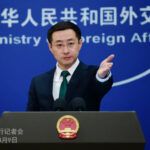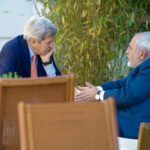Trump said he’d tear up the Iran nuclear deal. Now what?
By Ariane Tabatabai | November 10, 2016
Throughout his campaign, Donald Trump made it clear that he opposed the nuclear deal reached in July 2015 between six world powers and Iran, which curbs Tehran’s nuclear program in exchange for sanctions relief. With his election as president of the United States, Iran, US negotiating partners, the broader international community, and US adversaries alike are all wondering what will become of the agreement. At stake is not only the future of the nuclear deal—known as the Joint Comprehensive Plan of Action, or JCPOA—but also US-Iran relations and America’s credibility and reliability as a leader in multilateral processes.
Trumping the deal. Trump called the JCPOA “the stupidest deal of all time.” He argued that it will “absolutely” give Iran the bomb and suggested that it has transformed Tehran from a state on the verge of collapse into “a big power.” In short, Trump believes that the United States gave up everything and got nothing in return. But despite his vocal criticism, he has failed to outline any concrete shortcomings of the deal. In one of his more outlandish statements, he noted that the JCPOA failed to put pressure on Tehran to “do something with respect to North Korea.” But he has said virtually nothing about the agreement’s actual provisions. Trump’s advisers have said that he would “counteract Iran’s ongoing violations of the Joint Comprehensive Plan of Action,” but he has not said what he thinks those violations are. Ultimately, Trump’s stated goal is to dismantle the deal and negotiate a “better one.” His flawed assumption that he is capable of doing so, also held by many other US hardliners, doesn’t take into account the fact that if Washington unilaterally withdraws from the process, there will be no other deal for the foreseeable future. Iranian hardliners will be empowered and strengthened in their belief that the United States can’t be trusted, and the broader public will share the sentiment. What incentive would there be for Tehran—having complied with the JCPOA’s provisions—to return to the negotiating table, just because the US government decided one year into the implementation process that it had changed its mind?
Iranians on Trump. Watching the US elections, perplexed Iranians and the international community asked themselves what a Trump victory would mean for US foreign policy. Would the JCPOA survive a Trump presidency? Would Trump reverse President Barack Obama’s engagement policy? Would the elections embolden right-wing hardliners elsewhere, including in Europe and Iran? Due to the ambiguous nature of his statements and the vagueness of his policy positions, we still have few answers to these questions. This is in stark contrast to his rival, Hillary Clinton, whose foreign policies—in general and on Iran in particular—were crystal clear.
This has led many Iranians to believe that Trump would actually be a better US president for Iran than Clinton, whose hawkish Iran policy was set in stone. Some have also noted that Trump would find it more challenging to build a coalition and get international support to put pressure on Tehran for its various activities. Other Iranians believe that Trump’s lack of a cohesive and rational Iran policy is a challenge rather than an opportunity.
In general, though, most Iranians simply believed that a Clinton presidency was a given. Several newspapers came out on Wednesday with headlines based on that assumption. Since Trump won, Iranian leaders have been quick to react, reassuring Iranians that it won’t be as easy for the new US president to step away from the nuclear deal as he claims. The moderate President Hassan Rouhani, who will be up for reelection just four months after Trump’s inauguration, highlighted the multilateral nature of the agreement. The deal, he reassured the nation, can’t be undone by a single government. Iran’s Foreign Minister and chief nuclear negotiator Javad Zarif also weighed in, inviting Trump to “understand the realities of today’s world” and continue to implement the deal. The Atomic Energy Organization of Iran stated that the country “would continue implementing the BARJAM,” the Persian acronym for the agreement.
The uncertainty of the US election cycle has contributed to the sluggishness of Iran’s economic recovery, with businesses anxiously waiting for clarity and consistency. The prospect of a Trump presidency that would undo the deal or fail to implement and strengthen it left many wondering if investing in Iran would be worth the effort. If this trend continues with Trump’s inauguration in January, it may seriously jeopardize the nuclear deal, and have implications for Rouhani’s ability to secure a second term as president.
A role for US allies. The five other countries that negotiated with Iran alongside the United States—France, Germany, Great Britain, China, and Russia—were already perplexed by US national discourse on the Iran talks and resulting agreement. Traveling to European capitals in July 2015, I often heard more questions about the state of affairs in the United States than in Iran from EU officials and parliamentarians.
Today, America’s European partners face a new challenge: The team of US leaders who feel ownership of the JCPOA and want to see it succeed are leaving their place to a team without any clear objectives or plans vis-à-vis Iran and its nuclear program. The European partners are still eager to engage with Tehran, and they’ve made some progress in the past few months. For example, Tehran is beginning to discuss human rights with European officials. And this type of engagement seems to have the backing of not just moderates and reformists in Iran, but more conservative factions, too.
But if the nuclear deal isn’t sustained, all these efforts will have to take a backseat to trying to find another international solution to curbing the Iranian nuclear program. As more than a decade of pressure, sanctions, and threats of war have demonstrated, this won’t be an easy task. And the international community won’t sit back and follow Washington’s lead if Trump unilaterally pulls out of the JCPOA, disregarding the wishes of US allies. If he does go down that path, Trump will undermine US credibility and reliability, signaling to the world that the United States doesn’t keep its word.
Even if he doesn’t pull the United States out of the JCPOA implementation process, though, Trump could still destabilize it. Republicans, generally more inclined to pass new sanctions and put obstacles in the way of the nuclear agreement, won both the House and Senate. That makes it crucial for US partners eager to see the agreement succeed to defend it.
The next couple of months will be critical to making sure the JCPOA survives by strengthening its foundations. First, it is vital that the current channels of communication between Washington and Tehran be fortified, and new ones created, on various levels of key institutions, including among civil servants at the State Department, Energy Department, and US Treasury. These ties must go beyond political appointees, many of whom will be replaced come January.
Second, non-governmental experts and civil society will play a key role fact checking and holding officials and journalists accountable for their statements about the nuclear agreement’s implementation process. Throughout the talks and since the deal was signed, there have been many instances of exaggerated or false reporting on the process, which could have easily torpedoed the deal had it not been for the expert community and the administration’s due diligence. This means that experts must address, rather than dismiss, emerging information and reports, even when they don’t seem to be solidly grounded in facts.
Third, US partners, especially the European countries, have not always been assertive throughout the negotiation and implementation process, but it is essential that they become so now, because they all have a stake in ensuring that the JCPOA survives past Trump’s time in office. This means that they must prepare to step up and tackle challenges and obstacles as they emerge, and serve as a check on Washington.
Together, we make the world safer.
The Bulletin elevates expert voices above the noise. But as an independent nonprofit organization, our operations depend on the support of readers like you. Help us continue to deliver quality journalism that holds leaders accountable. Your support of our work at any level is important. In return, we promise our coverage will be understandable, influential, vigilant, solution-oriented, and fair-minded. Together we can make a difference.
Topics: Columnists, Nuclear Weapons














